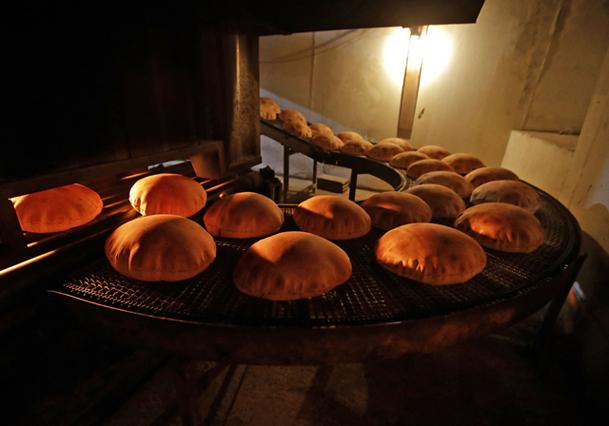You are here
Middle East grain buyers avoid Ukraine, import bills could rise
By Reuters - Mar 12,2014 - Last updated at Mar 12,2014

AMMAN — Turmoil in Ukraine is driving Middle Eastern grain buyers to shy away from striking new deals there and to consider rival suppliers, a shift that is likely to push up import bills.
The Black Sea region, mostly Ukraine and Russia, has become the major source of wheat and barley for Middle East importers from Libya, Egypt and Syria to Saudi Arabia and Yemen, dislodging US, Canadian and European suppliers who once dominated the market.
Middle Eastern commodity traders and officials said fears that tensions between Russia and Ukraine could come to a head, however, are discouraging most buyers from striking deals with Ukraine suppliers for the new season, which starts in July.
“At this time of the year, end of March, people are selling forward contracts for the new crop. Traders and trade houses start selling July shipments. This is not happening now. People are very reluctant; they don’t know what to expect,” said Tony Mudallal, a senior commodities trader in an international house.
Ukraine, the world’s third-biggest maize exporter, also has come to dominate in corn exports, taking market share from traditional suppliers such as Argentina and Brazil.
“Ukraine proved to be a powerhouse in the trade of grains in the last 10 years. It affected the region positively in terms of supply, mainly in wheat, corn and barley,” Mudallal added.
On the supply side in Ukraine, foreign trading houses are avoiding fixing new grain export contracts as well. Russian corn export prices also have been rising for two weeks.
Ukraine’s main ports continue to operate, but Middle Eastern traders were concerned that shipping could be affected.
“The situation could change if fighting breaks out,” said Malak Jehad Al Akiely, a dealer in International Grain Suppliers-Jordan operation.
“If Ukraine enters into more turmoil, this could mean declaring force majeure, and that would definitely cause tension around other Black Sea origins and raise insurance premiums,” an Egyptian government source said.
Conflict-torn Syria, which has relied mainly on Ukrainian wheat in the last two years to cover a shortfall in local production, is likely to be the hardest hit by the Black Sea conflict, traders say.
Any delays in grain shipments could exacerbate Syria’s food shortages as western financial sanctions make it more difficult to switch to alternative markets, according to two Damascus-based Syrian traders.
Import bills to rise
The quality of Ukraine’s grain and its proximity to Mediterranean ports have helped it win lucrative business from Middle East state importers with lavish budgets to subsidise bread and basic foodstuffs at low prices.
Middle Eastern countries have already sealed deals for around 80 per cent of the grain they need for the current season to end-June, traders said.
A switch to other sources is likely to push up Middle Eastern import bills substantially in the coming season, however, with prices rising by $120-$150 per tonne from levels in existing contracts of around $280 per tonne FOB for Russian and Ukrainian wheat, according to regional experts.
“Ukrainian grains are very competitive price-wise, and they are as good or even better quality than say western European or other sources,” another commodities trader based in Jordan said.
“If the situation escalates, it means the Middle East consumers will pay a higher bill by up to $150 per tonne,” he indicated.
A Cairo-based trader said the crisis was already driving up prices for new deals.
“Egypt had banked on doing more buying from the US for example, but now prices are up as far as $304 a tonne on a FOB basis,” the trader said.
Middle Eastern state and private importers are likely to diversify to Romania, Bulgaria and western European suppliers, particularly France and the Baltic states.
“Russian and Romanian and other Black Sea origins could replace Ukraine, but also French wheat, which is priced slightly higher,” the Egyptian government source said.
Egypt, the world’s largest wheat importer, has said it will reconsider a rule that limits moisture content and excludes mostly French wheat.
That issue has to be resolved, the source noted. “We need to open the door to as many origins as possible and then choose.”
Even US and Australian wheat exporters may also see a comeback in shipments of corn to Egypt, which has relied on Ukraine for years.
“Today, Ukraine is still exporting. Yes, the price is going to differ. Eastern Europe will love this,” a Lebanese grains trader said.
As for shipments so far, Egypt’s main state grain buyer, the General Authority for Supply Commodities (GASC), has said the crisis would not affect any shipments already purchased.
If grain exports are disrupted through the port of Sebastopol in Crimea, Ukraine can still export to the region through its main deepwater ports of Odessa, Illichivsk and Yuzhny, traders say.
A significant volume of Russian and Ukrainian grain exports is shipped directly in 5,000-tonne vessels from small Black Sea ports in the Sea of Azov on the southern coastlines of Russia and Ukraine to ports in Egypt, North Africa and eastern Mediterranean such as Latakia and Beirut.
Also traders are concerned about the military buildup taking place in Crimea near the Strait of Kerch, a major transhipment point for Ukrainian and Russian grain shipments to the Middle East, where 5,000-tonne barges cross and 50,000-tonne cargoes load.
“Kerch is now witnessing a lot of military activity that is beginning to affect commercial vessel activity,” said one senior Middle Eastern commodities dealer.
“Even if you want to speak commercially about loading a vessel or doing some transhipment operation at this strait, the priority is going for the army not for the commercial,” the trader added.
“It disrupts Middle Eastern traders thinking of getting from Russia small barges and to top it off with mother vessels. You will think twice,” he noted.
Dealers said the potential that the conflict could lead to European Union trade sanctions against Russia was another factor weighing on their calculations.
Related Articles
ABU DHABI/CAIRO — Rattled by stringent new import rules, Egypt's wheat suppliers boycotted en masse a state tender on Tuesday, pushing the w
DUBAI/CAIRO — Egypt is considering rejecting 59,000 tonnes of French wheat purchased by state grain buyer GASC due to the presence of poppy
CAIRO — Russia's invasion of Ukraine could mean less bread on the table in Egypt, Lebanon, Yemen and elsewhere in the Arab world where
















